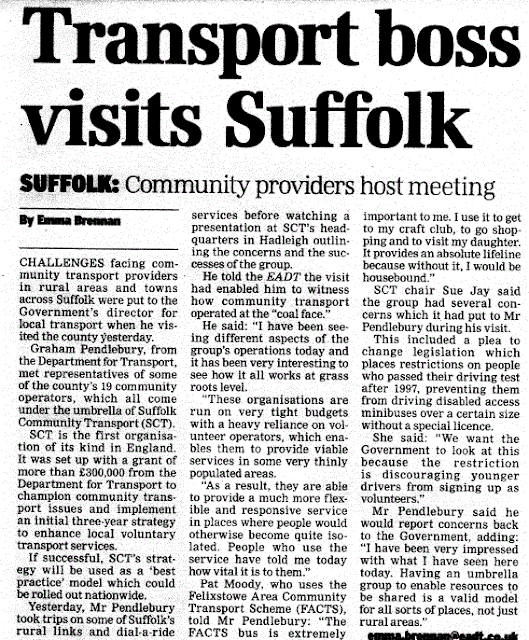Mr Pendlebury is a member of DfT’s central Strategy Committee, and chairs several programme boards and inter-departmental committees on behalf of other government departments. He is also a member of the Audit & Risk Committees of the Government Car and Despatch Agency and the Driving Standards Agency.
He was Director of Road and Vehicle Safety & Standards from 2004 to 2007, with responsibility for road casualty reduction, traffic management policy and certain transport technology issues.
Previous posts in the DfT and its predecessors at senior civil service level involved responsibility for tackling the environmental impacts of air transport (2001-2004) and management of long term strategic thinking and cross-cutting work (1999-2001). He has also held posts in the international aviation and rail sections of the Department, and was Principal Private Secretary to the Minister for Roads and Traffic in 1989-91.
Mr Pendlebury kindly wrote and acknowledged he had taken the issues presented away with him.
The story was reported on the same day of the less heralded news that the Lowestoft Minibus for the Blind have appealed for more volunteer drivers who must be licensed before 1997.
EADT story: http://tinyurl.com/cupn4mb
Background why D1 issue is important: http://tinyurl.com/bnfsspd
Apologies to the EADT but the report is posted here because sometimes stories drop off their website.
Suffolk: Community transport boss visits Suffolk
By Emma BrennanWednesday, May 1, 2013
CHALLENGES facing community transport providers in rural areas and towns across Suffolk were put to the Government’s director for local transport when he visited the county yesterday.
Graham Pendlebury, from the Department for Transport, met representatives from some of the county’s 19 community operators that all come under the umbrella of Suffolk Community Transport (SCT).
SCT is the first organisation of its kind in England. It was set up with a grant of more than £300,000 from the Department for Transport to champion community transport issues and implement an initial three-year strategy to enhance local voluntary transport services.
If successful, SCT’s strategy will be used as a ‘best practice’ model which could be rolled out nationwide.
Yesterday, Mr Pendlebury took trips on some of Suffolk’s rural links and dial-a-ride services before watching a presentation at SCT’s headquarters in Hadleigh outlining the concerns and the successes of the group.He told the EADT the visit had enabled him to witness how community transport operated at the “coal face.”
He said: “I have been seeing different aspects of the group’s operations today and it has been very interesting to see how it all works at ground roots level. These organisations are run on very tight budgets with a heavy reliance on volunteer operators, which enables them to provide viable services in some very thinly populated areas. As a result, they are able to provide a much more flexible and responsive service in places where people would otherwise become quite isolated. People who use the service have told me today how vital it is to them.”
Pat Moody, who uses the Felixstowe Area Community Transport Scheme (FACTS), told Mr Pendlebury: “The FACTS bus is extremely important to me. I use it to get to my craft club, to go shopping and to visit my daughter. It provides an absolute lifeline because without it, I would be housebound.”
SCT chair, Sue Jay said the group had several concerns which it had put to Mr Pendlebury during his visit. This included a plea to change legislation which places restrictions on people who passed their driving test after 1997, preventing them from driving disabled access minibuses over a certain size without a special licence.
She said: “We want the Government to look at this because the restriction is discouraging younger drivers from signing up as volunteers.” Mr Pendlebury said he would report concerns back to the Government, adding: “I have been very impressed with what I have seen here today. Having an umbrella group to enable resources to be shared is a valid model for all sorts of places, not just rural areas.”


No comments:
Post a Comment